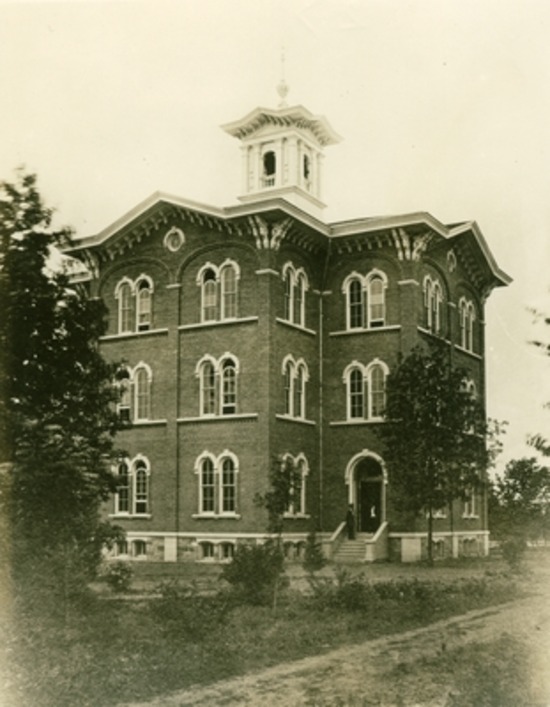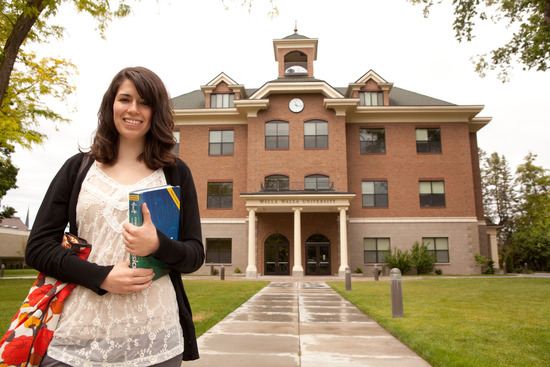The Seventh-day Adventist Church has about 118 tertiary schools around the world.1 Though many of them are within North America, you’ll also find Adventist universities in countries across the world—places like Croatia, Austria, Brazil, Madagascar, and the Philippines.
Adventist higher education is perhaps best known for theology and medical training.
But by no means do the options stop there. Among the 118 schools, you’ll find programs in many fields, from aviation to sociology and culinary arts to music. These schools are committed to supporting young people in serving God through the interests, talents, and skills He’s given them.
Do you want to learn more about Adventist higher education and what it has to offer prospective students?
Here, we’ll break down:
- Programs offered in Adventist higher education
- The origins of Adventist higher education
- What makes Adventist education different
- Resources to learn more
Let’s dive in!
What programs does Adventist higher education offer?
 Adventist higher education offers as many programs as secular universities—and then some! They offer accredited undergraduate and graduate programs with over 100 majors, depending on the school you attend.
Adventist higher education offers as many programs as secular universities—and then some! They offer accredited undergraduate and graduate programs with over 100 majors, depending on the school you attend.
These include programs in2:
- Accounting
- Agriculture
- Animation
- Archaeology
- Architecture
- Aviation
- Biology
- Business
- Chemistry
- Communications
- Computer science
- Culinary arts
- Education
- Engineering
- English
- Film
- Finance
- Fine arts
- Graphic design
- Health science
- History
- Language studies
- Law and legal studies
- Mathematics
- Mechanic and repair technology
- Music
- Philosophy
- Photography
- Physics
- Psychology
- Sociology
- Writing
Some schools have even begun to offer trade programs in auto mechanics, technology, and construction.3
While the programs available depend on where you go, almost every Adventist school has strong theology and medicine programs. And some schools specialize in these areas.
For example, Andrews University, home to the Seventh-day Adventist Theological Seminary, is one of the most popular universities at which to complete a Masters of Divinity program. It also offers a Doctor of Ministry program.
 Other Seventh-day Adventist seminaries include:
Other Seventh-day Adventist seminaries include:
- HMS Richards Divinity School (La Sierra University, California)
- Bogenhofen Seminary (Austria)
- Belgrade Theological Seminary (Serbia)
- Seventh-day Adventist Maranatha Seminary (Bangladesh)
When it comes to schools with well-known medical programs, Loma Linda University has the most popular graduate program. Meanwhile, Southern Adventist University is known for its excellent undergraduate nursing programs.
And they’re not the only ones. The following schools are also known for their medical/nursing programs:
- AdventHealth University (Florida)
- Kettering College (Ohio)
- Washington Adventist University (Washington, DC)
- Walla Walla University (Washington)
- Adventist College of Nursing and Health Sciences (Malaysia)
- Adventist University of the Philippines
- Babcock University (Nigeria)
Wondering why Adventist schools emphasize theology and medicine?
The simple reason is that Adventists are mission-oriented, seeking ways to share the gospel and serve others. Both theological and medical programs offer clear opportunities for students to use their gifts in the mission field.
 But Adventist schools don’t stop there.
But Adventist schools don’t stop there.
They’re passionate about helping every student pursue their unique calling. They encourage everyone, regardless of major, to use their talents to honor God and serve others.
When did Adventist higher education begin?
Adventist higher education began when the General Conference of Seventh-day Adventists created the Seventh-day Adventist Educational Society. In 1874, this society, with the help of some sponsors, established the first Adventist college—Battle Creek College in Battle Creek, Michigan.4
The college accepted both male and female students, which allowed women to pursue higher education at a time when educational opportunities were slowly becoming more available for them.
By its first year, the school enrolled 289 students.5
This school helped students pursue higher education under the guidance of Christian values. It also taught students how to spread the gospel by providing them with biblical teaching and a mission emphasis.6
As the years passed, Battle Creek College relocated to Berrien Springs, Michigan, where it changed its name to Emmanuel Missionary College.7 The college has since been renamed Andrews University, where over 3,500 students enroll for courses every year.8
Adventist education has come a long way since 1874. In fact, it’s now the largest Protestant education system in the world with over 5,000 schools across the globe.9
What makes Adventist education different?

Though Adventist schools have many similarities academically to other schools, what makes them different is how they’re shaped by the biblical values that Adventists hold.
The schools express these values through:
- Offering religious programs and worship opportunities unique to Adventism: These include times of morning and evening worship, weeks of prayer, vespers to begin and end Sabbath, and Sabbath services.
- Integrating faith into the curriculum: They present their course material from a biblical worldview. Teachers may also make time for prayer and devotionals in class.
Forming partnerships with local Seventh-day Adventist churches: They may work with a local church to serve the spiritual needs of their students. - Having university chaplains: They have chaplains who can provide mentorship and spiritual guidance for young people.
- Hiring Adventist staff and teachers: They hire Adventist staff to promote a Christian environment.
- Keeping Sabbath: The campus schedule fosters an environment of Sabbath keeping for students and staff from Friday evening to Saturday evening.
- Serving healthy (often vegetarian) food: Adventist schools promote healthy living through the food served in their cafeterias.
- Having community service and mission opportunities: Adventist schools encourage students to help their community and those in need. They also offer mission trips where students can serve others while gaining cultural experiences.
- Having work-study programs: They offer work-study programs so students can gain practical experience while paying off their tuition.
With the uniqueness of these schools come many advantages. We’ll look at some of those next.
What are the advantages of Adventist higher education?

Photo by Naassom Azevedo on Unsplash
The biblical emphasis and promotion of Christian values is one of the big advantages of attending an Adventist college. But there’s more.
Here are some key advantages:
- Smaller campuses: Most Adventist schools tend to be on the smaller side. This allows the campus community to become a more tight-knit group, making it easier for students to find friendships. It also helps students receive more one-on-one assistance from their teachers.
- Support from teachers and staff: Adventist teachers seek to encourage their students and mentor them. Some staff will even invite students to their homes on Friday or Sabbath evenings.
- A Bible-centered curriculum: Students receive instruction from a biblical perspective and learn how to apply their beliefs in practical ways.
- A whole-person education: Adventist schools aren’t just concerned about students getting good grades. They’re concerned with how students are growing in every sphere of life. They want students to grow spiritually, mentally, physically, and emotionally.
These wonderful advantages of Adventist education didn’t come about by chance. They were inspired by what Adventist pioneer Ellen White wrote about Christian schools.10
In her book Education, she emphasized that Christian education was never just about developing students’ intellect. It was about developing their entire being—for now and eternity:
“True education means more than the perusal of a certain course of study. It means more than a preparation for the life that now is. It has to do with the whole being, and with the whole period of existence possible to man. It is the harmonious development of the physical, the mental, and the spiritual powers. It prepares the student for the joy of service in this world and for the higher joy of wider service in the world to come.”11
These advantages do come with a price tag, though. Adventist schools are often pricey today. But thankfully, the cost doesn’t have to stop any student who desires a Christian education. Many of these schools offer financial aid, scholarships, and other opportunities that we’ll cover in the following section.
Are there affiliated programs or sponsorship options?
Yes, Adventist schools offer affiliated education programs and sponsorship opportunities.
Affiliated education programs are formed between Adventist universities and other schools or organizations.12 They allow students to build networks with other schools and often offer dual-enrollment programs.
Many schools also provide sponsorship opportunities for their students. Schools will often partner with local churches or organizations to sponsor students through grants or scholarships.13 This way, students, regardless of their financial abilities, can benefit from the education offered at an Adventist institution.
How to learn more about Adventist higher education

Photo by Mimi Thian on Unsplash
If you’re looking into Adventist education to see if it’s right for you, these resources will help you in your search:
- Adventist Education: This website provides general information about Adventist education.
- Adventist Colleges and Universities: Here, you’ll find links to Adventist college websites and a list of the majors Adventist schools offer. There’s even a page about financial aid.
- Adventist Education Department: This is the official website of the General Conference Education Department.
- Adventist Locator: This site provides the locations of Adventist schools in North America. Just type a area or school name in the search bar, and it’ll give you a map of its location.
- Adventist Directory: This site contains a list of every Adventist school in existence. Just click on the world divisions tab, select your division, and select the education tag under sub-entities to pull up a list. It’ll give you the names of schools in that area, their accreditation status, and website addresses for specific schools.
- Adventist Accrediting Association: This website lists all Adventist schools. It also provides regular evaluations of these schools’ accreditation status.
- Adventist Colleges Abroad: This site talks about study-abroad opportunities.
- Seventh-day Adventist Education Statistics: You can find enrollment data here. It will also tell you how many schools and educators there are on the primary, secondary, and tertiary levels.
- Adventist International Institute of Advanced Studies: This provides the philosophy of Adventist education.
- Adventist Archives: This page contains information about the development of Adventist education throughout history.
Adventist education is unique in that it prepares students not only for the workplace but also for a lifetime of following Jesus. It seeks to develop them mentally, spiritually, and physically.
If that sounds like something you’d be interested in, we encourage you to look into Adventist schools near you. God might be leading you to the school that will jump-start your career and grow your spiritual life.
Want to learn more about what the Adventist school system has to offer?
Related pages
- “Seventh-day Adventist Education Statistics,” Seventh-day Adventist Education Department, Seventh-day Adventist World Church, https://www.adventist.education/education-statistics/. [↵]
- “Undergraduate Areas of Study,” Adventist Colleges and Universities. [↵]
- “Applied Technology,” Southern Adventist University. [↵]
- Erickson, Charlotte, “Battle Creek Academy,” Encyclopedia of Seventh-day Adventists. [↵]
- “Timeline of Seventh-day Adventist Education,” Adventist Archives. [↵]
- Ibid. [↵]
- Ibid. [↵]
- “About Andrews,” Andrews University. [↵]
- “About History,” Loma Linda Academy. [↵]
- Rasi, Humberto M, “Education, by Ellen G. White,” Encyclopedia of Seventh-day Adventists. [↵]
- White, Ellen, Education, p. 13. [↵]
- “About WAU,” Washington Adventist University. [↵]
- “How to Pay for College,” Adventist Colleges and Universities. [↵]
More Answers
What Is an Adventist Book Center (ABC)?
When you walk into any one of the many Adventist Book Center (ABC) locations, chances are you’ll be greeted by pleasant gospel music in the background, friendly employees, and row after row of Christian books, movies, Bibles, study guides, kids’ games, and more.
Do Seventh-day Adventists Celebrate Holidays?
Wondering whether your Adventist classmate or coworker keeps the same holidays you do? Perhaps you want to include them in some festivities, but you also want to respect their beliefs. Thus, you’re unsure of how to navigate the holiday question. Will they accept your invitation to the office Christmas party?
The Adventist Haystack (It’s Not What You Think) + 4 Recipes
Haystacks are basically a taco salad—with an Adventist spin on it! Most versions are vegetarian and offer an endless combination of tasty toppings. We eat them often because they’re healthy, scrumptious, and easy to make.
Do Seventh-day Adventists Believe in Medical Care?
The Seventh-day Adventist Church believes in and supports evidence-based medical care. In fact, medicine has played a significant part in our history, and today we run a major health system with hospitals, medical schools, and clinics throughout the world.
Why do Adventists Emphasize Religious Liberty?
Adventists see religious liberty as an essential human right. After all, God endowed humanity with freedom of choice from the very beginning. So we believe it’s best for governments to also support their citizens’ rights to worship based on their convictions.
All about Adventist Elementary Schools
The Seventh-day Adventist Church operates the largest Protestant education system in the world. A big part of this system is our K-8 elementary schools, or primary schools, as they’re known in other parts of the world.
What Are Pathfinder and Adventurer Clubs?
Like the boy or girl scouts, Pathfinders and Adventurers learn about nature and life skills. But what makes these clubs special is their purpose to bring young people closer to Jesus.
13th Sabbath Offering: What It Is and Why It Matters
While the previous 12 Sabbaths of the quarter feature an established Adventist ministry and its current giving needs, the 13th is a rotating spot reserved for current mission projects.
A Look at Adventist Colleges and Universities
On the outside, Seventh-day Adventist universities may not look much different than other college campuses. But the real differences are beneath the surface.
What Is ASI (Adventist-Laymen’s Services and Industries)?
ASI, which stands for Adventist-laymen’s Services and Industries, is a membership-based organization that provides support for Seventh-day Adventist laypeople (Adventist professionals who aren’t pastors).
What Are Adventist Evangelistic Meetings?
The Seventh-day Adventist Church puts a huge emphasis on sharing the gospel through evangelism, or sharing the gospel through preaching, teaching, and testimony. One of the ways we accomplish this is by organizing public events called evangelistic meetings.
Christian Summer Camps—A Cherished Adventist Ministry
School’s out, the sun’s shining, and your kids are thrilled to have the summer ahead of them. Then three days in, you hear, “I’m bored…”
Do Adventists Have Their Own Bible?
Adventists have some unique beliefs—you might be able to name some of them right now. The seventh-day Sabbath. Death as a sleep. Hell as nonexistence.
What Is Vespers?
Friday rolls around, and you’re spending time with your Adventist friends or relatives when they mention they’re going to vespers tonight.
Adventist Pastors
What is the role of a pastor in the Adventist Church? The position itself, at least as far as a local congregation is concerned, is not much different from that of pastors in other protestant denominations.
The Leadership Structure of the Seventh-day Adventist Church
The Seventh-day Adventist Church has a representative form of structure that connects its 90,000-plus congregations across the globe and gives its members a part in decision-making. Though the Church was incorporated in 1863, this system came about during the church’s reorganization from 1901 to 1903. It includes four levels of organization.
Everything You Need to Know About Sabbath Meals
For Seventh-day Adventists, sharing a Sabbath meal with friends and family is one of the most special and memorable parts of the Sabbath.
What to Expect When You Go to an Adventist Church
If you’re attending an Adventist church for the first time, you may wonder what it’s really like. While each Adventist church is unique in its collective personality and local culture, Adventist church services are generally similar to most other Protestant church services.
Adventist Education
Seventh-day Adventists have historically upheld the importance of a well-rounded, high-quality education. Instead of a one-size-fits-all approach to teaching and learning, the Adventist Education system operates on the principle of educating the “whole” person.
Evangelism
Evangelism is simply sharing the truths of the Bible with someone else. And Adventists are all into it.
Everything You Need to Know About an Adventist Church Potluck
Every so often, usually on a schedule ranging from once a week to once a month to once a quarter, an Adventist church will have “fellowship dinners,” often casually referred to as potlucks.
The Seventh-day Adventist Hymnal
The Seventh-day Adventist Hymnal is a songbook used worldwide by many Adventist congregations during their worship services. Since its publication in 1985, it has helped foster praise to God while reminding church members of our mission and drawing them closer to Jesus.
Everything You Need to Know about Sabbath School
Sabbath School is the Bible study component of the church program at most Seventh-day Adventist Churches. It’s a time of Bible study on a specific topic or lesson. Instead of listening to a preacher, people interact with one another, making it a great opportunity for building friendships.
What Are Seventh-Day Adventist Sermons Like?
In nearly every Seventh-day Adventist Church, the sermon is the focal point of the main service—similar to many Protestant Christian denominations. It is a time of biblical instruction by the pastor, who shares what they’ve been studying in the Bible and preparing over the previous week.
Who Are Adventists
The Seventh-day Adventist Church—“Adventists” for short—is a Christian denomination of ordinary people who seek to follow Jesus and live out His mission in this world. Established in 1863, we hold to the Protestant principle of sola scriptura, which means the Bible guides everything we do.
How do Adventists choose what to eat?
Food blogs overwhelm the internet; food fads are all the rage; and copycat and healthy versions of food are the subject of many a get-together.
Didn’t find your answer? Ask us!
We understand your concern of having questions but not knowing who to ask—we’ve felt it ourselves. When you’re ready to learn more about Adventists, send us a question! We know a thing or two about Adventists.





























